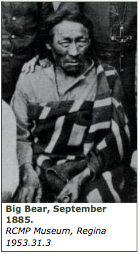
Born near Jackfish Lake around 1825 to an Ojibwa chief named Black Powder (Mukitoo), Big Bear spoke Cree as a first language, but also Ojibwa. Contracting smallpox in 1837, he survived with disfiguring facial markings that he commonly referred to in jest, shouting happily “Now I feel very handsome!” He was a capable and uncompromising leader; but his adherence in traditional customs made him appear stubborn in the eyes of the federal government. Big Bear hesitated to sign Treaty 6, and became the leader of the First Nations who remained outside of it. He led his followers to the Cypress Hills, where they faced starvation from lack of game and the withholding of food rations, as the federal government attempted to coerce them to sign treaty and move onto reserves. Big Bear still refused to sign. He and his followers moved to Montana, where he spent time with Sitting Bull and Louis Riel, discussing a means to perpetuate their way of life. Big Bear realized that if all the tribes of the North-West Territories spoke with a united voice they could achieve more in their negotiations with the federal government. Faced with another winter of starvation, he grudgingly signed Treaty 6 in 1882, but as he did not choose a location for his reserve his people did not receive rations. In the summer of 1884 he met Riel at Duck Lake but failed to be swayed by Riel’s plans. Big Bear waited to choose a reserve in the spring of 1885, but his decision drew much criticism from his band. As his authority declined, Wandering Spirit gained influence over the more militant band members. Big Bear continued his attempts to reach a peaceful resolution but was unsuccessful. The arrival of troops from eastern Canada squelched the Métis resistance, and First Nations people including Wandering Spirit, Miserable Man, Four-Sky-Thunder, and Big Bear surrendered. Big Bear was tried in Regina on September 11, 1885, on four counts of treason-felony and was imprisoned in Stony Mountain Penitentiary, Manitoba. When he was freed two years later, his integrity remained intact but he was broken in health and spirit. He died in the winter of 1887–88.
Christian Thompson
Further Reading
Dempsey, H. 1984. Big Bear: The End of Freedom. Vancouver: Douglas & McIntyre; Stonechild, B. and B. Waiser. 1997. Loyal Till Death: Indians and the North-West Rebellion. Calgary: Fifth House.

